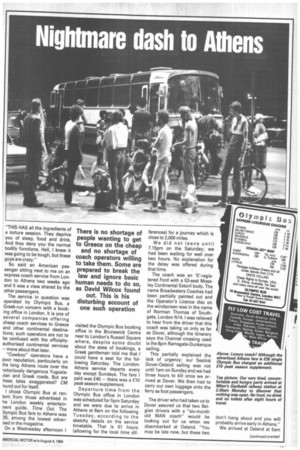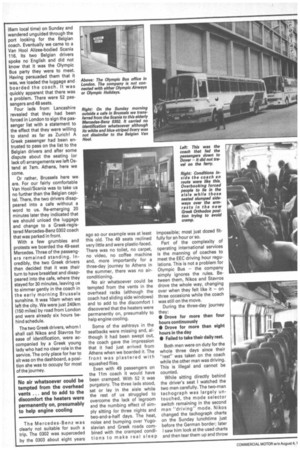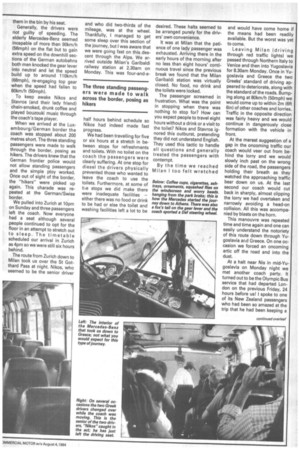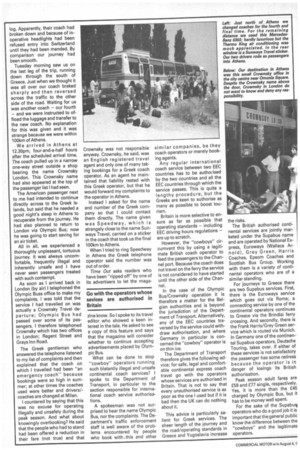Nightmare dash to Athens
Page 57

Page 58

Page 59

Page 60

If you've noticed an error in this article please click here to report it so we can fix it.
"THIS HAS all the ingredients of a torture session. They deprive you of sleep, food and drink. And they deny you the normal bodily functions. Hell, I knew it was going to be tough, but these guys are crazy."
So said an American passenger sitting next to me on an express coach service from London to Athens two weeks ago and it was a view shared by the other passengers.
The service in question was operated by Olympic Bus, a Greek-run concern with a booking office in London. It is one of several companies offering cheap coach services to Greece and other continental destinations; such operators are not to be confused with the officiallyauthorised continental services — more about that later.
"Cowboy" operators have a poor reputation, particularly on the long Athens route over the lotoriously dangerous Yugoslarian and Greek roads. But are hese tales exaggerated? CM 'ound out for itself.
I chose Olympic Bus at raniom from those advertised in he London weekly entertainnent guide, Time Out. The )Iympic Bus fare to Athens was 35, among the lowest adversed in the magazine.
On a Wednesday afternoon I visited the Olympic Bus booking office in the Brunswick Centre near to London's Russell Square where, despite some doubt about the state of bookings, a Greek gentleman told me that I could have a seat for the following Saturday. The LondonAthens service departs every day except Sundays. The fare I paid was £45 — there was a £10 peak season supplement.
Departure time from the Olympic Bus office in London was scheduled for 5pm Saturday and we were due to arrive in Athens at 8am on the following Tuesday, according to the sketchy details on the service timetable. That is 61 hours (allowing for the local time dif
ferences) for a journey which is close to 2,000 miles.
We did not leave until 7.15pm on the Saturday; we had been waiting for well over two hours. No explanation for the delay was offered during that time.
The coach was an 'S'-registered Ford with a 53-seat Moseley Continental Estoril body. The name Broadwaters Coaches had been partially painted out and the Operator's Licence disc on the windscreen was in the name of Norman Thomas of Southgate, London N14.I was relieved to hear from the driver that this coach was taking us only as far as Dover, although the itinerary says the Channel crossing used is the 8pm Ramsgate-Dunkerque sailing.
This partially explained the lack of urgency; our Sealink Dover-Ostend sailing was not until lam on Sunday and we had three hours to kill once we arrived at Dover. We then had to carry our own luggage onto the ferry as foot passengers.
The driver who had taken us to Dover assured us that two Belgian drivers with a "six-month old MAN coach" would be looking out for us when we disembarked at Ostend. "You may be late now, but these two (6am local time) on Sunday and wandered unguided through the port looking for the Belgian coach. Eventually we came to a Van Hool Alizee-bodied Scania 116. Its two Belgian drivers spoke no English and did not know that it was the Olympic Bus party they were to meet. Having persuaded them that it was, we loaded the luggage and boarded the coach. It was quickly apparent that there was a problem. There were 52 passengers and 48 seats.
Four lads from Lancashire revealed that they had been forced in London to sign the pas senger list with a statement to the effect that they were willing to stand as far as Zurich! A Greek passenger had been entrusted to pass on the list to the Belgian drivers and after some dispute about the seating (or lack of) arrangements we left Ostend at 7am. Athens, here we come.
Or rather, Brussels here we.
are. For our fairly comfortable Van Hool/Scania was to take us no further than the Belgian capi tal. There, the two drivers disappeared into a cafe without a word to us. Re-emerging 20 minutes later they indicated that we should unload the luggage and change to a Greek-registered Mercedes-Benz 0302 coach that was parked in front.
With a few grumbles and protests we boarded the 49-seat Mercedes. Three of the passeng ers remained standing. Incredibly, the two Greek drivers then decided that it was their turn to have breakfast and disappeared into the cafe, where they stayed for 30 minutes, leaving us to simmer gently in the coach in the early morning Brussels sunshine. It was 10am when we left the city. We were just 240km (150 miles) by road from London and were already six hours behind schedule.
The two Greek drivers, whom I shall call Nikos and Stavros for ease of identification, were accompanied by a Greek young lady who had no clear role in the service. The only place for her to sit was on the dashboard, a position she was to occupy for most of the journey.
No air whatsoever could be tempted from the overhead vents ... and to add to the discomfort the heaters were permanently on, presumably to help engine cooling The Mercedes-Benz was clearly not suitable for such a trip. The 0302 was superceded by the 0303 about eight years ago so our example was at least this old. The 49 seats reclined very little and were plastic-faced. There was no toilet, no carpet, no video, no coffee machine and, more importantly for a three-day journey to Athens in the summer, there was no airconditioning.
No air whatsoever could be tempted from the vents in the overhead racks (although the coach had sliding side windows) and to add to the discomfort I discovered that the heaters were permanently on, presumably to help engine cooling.
Some of the ashtrays in the seatbacks were missing and, although it had been swept out, the coach gave the impression that it had just arrived from Athens when we boarded it. The front was plastered with squashed flies.
Even with 49 passengers on the 11rn coach it would have been cramped. With 52 it was purgatory. The three lads stood, sat or lay in the aisle while the rest of us struggled to overcome the lack of legroom and the numbing effect of simply sitting for three nights and two-and-a-half days. The heat, noise and bumping over Yugoslavian and Greek roads combined with the cramped conditions to make real sleep impossible; most just dozed fitfully for an hour or so.
Part of the complexity of operating international services is the manning of coaches to meet the EEC driving hour regulations. This is not a problem for Olympic Bus — the company simply ignores the rules. Between them, Nikos and Stavros drove the whole way, changing over when they felt like it — on three occasions while the coach was still on the move.
During the three-day journey they: • Drove for more than four hours continuously • Drove for more than eight hours in the day • Failed to take their daily rest.
Both men were on duty for the whole three days since their "rest" was taken on the coach while the other man was driving. This is illegal and cannot be counted.
While sitting directly behind the driver's seat I watched the two men carefully. The two-man tachograph was largely untouched, the mode selector switch remaining in the second man "driving" mode. Nikos changed the tachograph charts on the Sunday lunchtime just before the German border; later I saw him look at the used charts and then tear them up and throw them in the bin by his seat.
Generally, the drivers were not guilty of speeding. The elderly Mercedes-Benz seemed incapable of more than 90km/h (56mph) on the flat but to gain extra speed on the downhill sections of the German autobahns both men knocked the gear lever into neutral and let the speed build up to around 110km/h (68mph), re-engaging top gear when the speed had fallen to 80km/h (50mph).
To keep awake Nikos and Stavros (and their lady friend) chain-smoked, drunk coffee and played bouzouki music through the coach's tape player.
When we arrived at the Luxembourg/German border the coach was stopped about 200 metres short. The three standing passengers were made to walk through the border, posing as hikers. The drivers knew that the German frontier police would not allow standing passengers and the simple ploy worked. Once out of sight of the border, the "hikers" were picked up again. This charade was repeated at the German/Swiss border.
We pulled into Zurich at 10pm on Sunday and three passengers left the coach. Now everyone had a seat although several people continued to opt for the floor in an attempt to stretch out to sleep. The timetable scheduled our arrival in Zurich as 4pm so we were still six hours behind.
The route from Zurich down to Milan took us over the St Got thard Pass at night. Nikos, who seemed to be the senior driver and who did two-thirds of the mileage, was at the wheel. Thankfully, I managed to get some sleep over this section of the journey, but I was aware that we were going fast on this descent through the Alps. We arrived outside Milan's Garibaldi railway station at 2.30am on Monday. This was four-and-a half hours behind schedule so Nikos had indeed made fast progress.
We had been travelling for five or six hours at a stretch in between stops for refreshments and toilets. With no toilet on the coach the passengers were clearly suffering. At one stop for diesel the drivers physically prevented those who wanted to leave the coach to use the toilets. Furthermore, at some of the stops we did make there were inadequate facilities — either there was no food or drink to be had or else the toilet and washing facilities left a lot to be desired. These halts seemed to be arranged purely for the drivers' own convenience.
It was at Milan that the patience of one lady passenger was exhausted. Arriving there in the early hours of the morning after no less than eight hours' continuous travel since the previous break we found that the Milan Garibaldi station was virtually closed. No food, no drink and the toilets were locked.
The passenger screamed in frustration. What was the point in stopping when there was nothing to stop for? How can you expect people to travel eight hours without a drink or a visit to the toilet? Nikos and Stavros ignored this outburst, pretending they did not understand English. They used this tactic to handle all questions and generally treated the passengers with contempt.
By the time we reached Milan I too felt wretched and would have come home if the means had been readily available. But the worst was yet to come.
Leaving Milan (driving through red traffic lights) we passed through Northern Italy to Venice and then into Yugoslavia for 8.30am Monday. Once in Yugoslavia and Greece the two Greeks' standard of driving appeared to deteriorate, along with the standard of the roads. Bumping along at 80km/h (50mph) we would come up to within 2m (6ft 6in) of other coaches and lorries. Traffic in the opposite direction was fairly heavy and we would continue in dangerously close formation with the vehicle in front.
At the merest suggestion of a gap in the oncoming traffic our coach would veer out from behind the lorry and we would slowly inch past on the wrong side of the road, the passengers holding their breath as they watched the approaching traffic bear down on us. At the last second our coach would cut back in sharply, almost clipping the lorry we had overtaken and narrowly avoiding a head-on collision. All this was accompanied by blasts on the horn.
This manouvre was repeated time and time again and one can easily understand the notoriety of this route down through Yugoslavia and Greece. On one occasion we forced an oncoming artic off the road and into the dust.
At a halt near Nis in mid-Yugoslavia on Monday night we met another coach party. It turned out to be the Olympic Bus service that had departed London on the previous Friday, 24 hours before us! I spoke to one of its New Zealand passengers who had been so amazed at the trip that he had been keeping a log. Apparently, their coach had broken down and because of inoperative headlights had been refused entry into Switzerland until they had been mended. By comparison our journey had been smooth.
Tuesday morning saw us on the last leg of the trip, running down through the south of Greece. Just when we thought it was all over our coach braked sharply and then reversed across the traffic to the other side of the road. Waiting for us was another coach — our fourth — and we were instructed to offload the luggage and transfer to the new coach. No explanation for this was given and it was strange because we were within 100km of Athens.
We arrived in Athens at 12.30pm, four-and-a-half hours after the scheduled arrival time. The coach pulled up in a narrow one-way street outside a shop bearing the name Crownsky London. This Crownsky name had also appeared at the top of the passenger list I had seen.
The American passenger next to me had intended to continue directly across to the Greek Islands, but said that he needed a good night's sleep in Athens to recuperate from the journey. He had also planned to return to London via Olympic Bus; now he was going to start saving for an air ticket.
All in all, we experienced a thoroughly unpleasant, tortuous journey. It was always uncomfortable, frequently illegal and inherently unsafe and I have never seen passengers treated with such contempt.
As soon as I arrived back in London (by air) I telephoned the Olympic Buss office to make my complaints. I was told that the service I had travelled on was actually a Crownsky Travel departure; Olympic Bus had passed over some of its passengers. I therefore telephoned Crownsky which has two offices in London; Regent Street and Grays Inn Road.
The Greek gentleman who answered the telephone listened to my list of complaints and then explained that the coach on which I travelled had been "an emergency coach" because bookings were so high in summer; at other times the coaches used were better and drivers!coaches are changed at Milan.
I countered by saying that this was no excuse for operating illegally and unsafely during the peak season. And what about knowingly overbooking? He said that the people who had to stand had been offered a reduction in their fare (not true) and that Crownsky was not responsible anyway. Crownsky, he said, was an English registered travel agent and only one of many taking bookings for a Greek coach operator. As an agent he maintained that liability rested with this Greek operator, but that he would forward my complaints to the operator in Athens.
Instead I asked for the name and number of the Greek company so that I could contact them directly. The name given was Speedway, which is strangely close to the name Sunways Travel, carried on a sticker in the coach that took us the final 100km to Athens.
When I tried to ring Speedway in Athens the Greek telephone operator said the number was out of order.
Time Out asks readers who have been "ripped off" by one of its advertisers to let the rnaga
zine know. So I spoke to its travel editor who showed a keen interest in the tale. He asked to see a copy of this feature and says that the magazine will consider whether to continue accepting advertisements placed by Olympic Bus.
What can be done to stop "cowboy" operators running such blatantly illegal and unsafe continental coach services? I spoke to the Department of Transport, in particular to the section responsible for international coach service authorisations.
A spokesman was not surprised to hear the name Olympic Bus, nor the complaints. The Department's traffic enforcement staff is well aware of the problems encountered by people who book with . this and other similar companies, be they coach operators or merely booking agents.
Any regular international coach service between two EEC countries has to be authorised by the two countries and all the EEC countries through which the service passes. This is quite a lengthy procedure, but the Greeks are keen to authorise as many as possible to boost tourism.
Britain is more selective to ensure as far as possible that operating standards — including EEC driving hours regulations — are up to scratch.
However, the "cowboys" circumvent this by using a legitimate British coach operator to feed the passengers to the Channel port. Because the coach does not travel on the ferry the service is not considered to have started until the other side of the Channel.
In the case of the Olympic Bus/Crownsky operation it is therefore a matter for the Belgian authorities and is beyond the jurisdiction of the Department of Transport. Alternatively, any of the EEC countries traversed by the service could withdraw authorisation, and where Germany in particular is concerned the "cowboy" operator is on thin ice.
The Department of Transport therefore gives the following advice; for safe, legal and comfortable continental express coach travel go with the operators whose services are authorised in Britain. That is not to say that every unauthorised service is as poor as the one I used but if it is bad then the UK can do nothing about it.
This advice is particularly salient for Greek services. The sheer length of the journey and the road/operating standards in Greece and Yugoslavia increase The British authorised continental services are jointly marketed under the Supabus name and are operated by National Express, Euroways (Wallace Arnold ), Grey Green, Harris Coaches, Epsom Coaches and Scottish Bus Group. Working with them is a variety of continental operators who are of a similar standing.
For journeys to Greece there are two Supabus services. First, there is the Euroways service which goes out via Rome; a connecting service by one of the continental operators continues to Greece via the Brindisi ferry crossing. And secondly, there is the Frank Harris/Grey Green service which is routed via Munich. In Germany one of the continental Supabus operators, Deutsche Touring, takes over. If either of these services is not satisfactory the passenger has some redress because the operator is in danger of losings its British authorisation.
Peak season adult fares are £59 and £77 single, respectively. Yes, it is more than the £45 charged by Olympic Bus, but it has to be money well spent.
For the sake of the Supabusi operators who do a gcod job it is important that the general public know the difference between the "cowboys" and the legitimate operators.
























































































